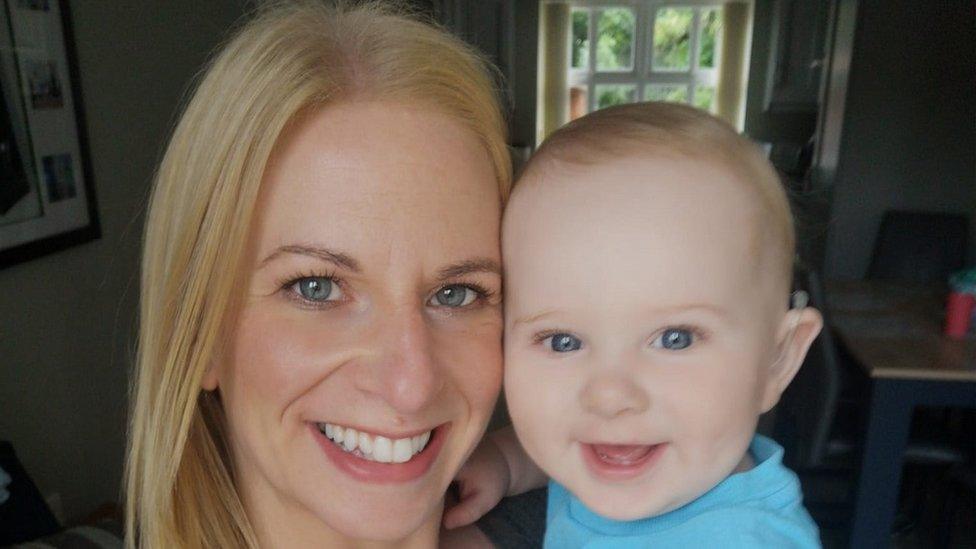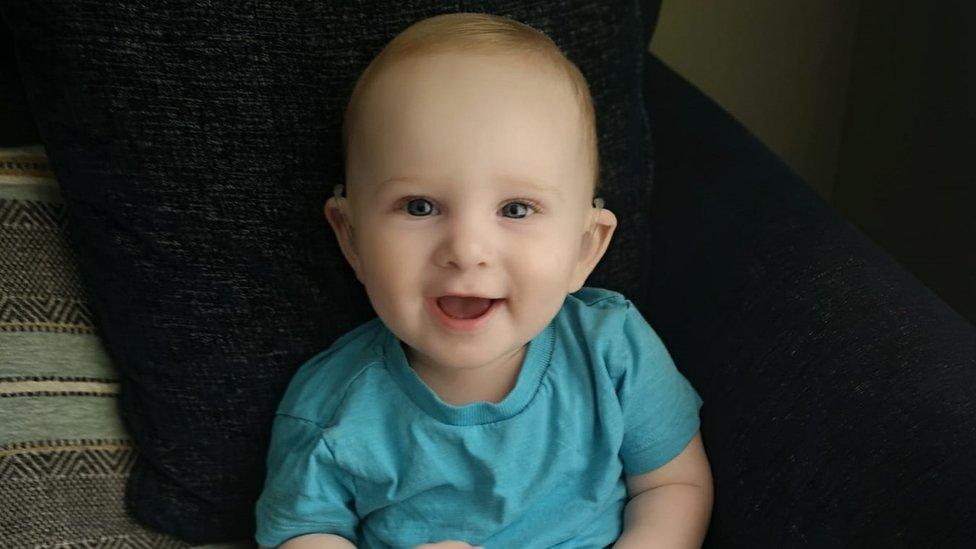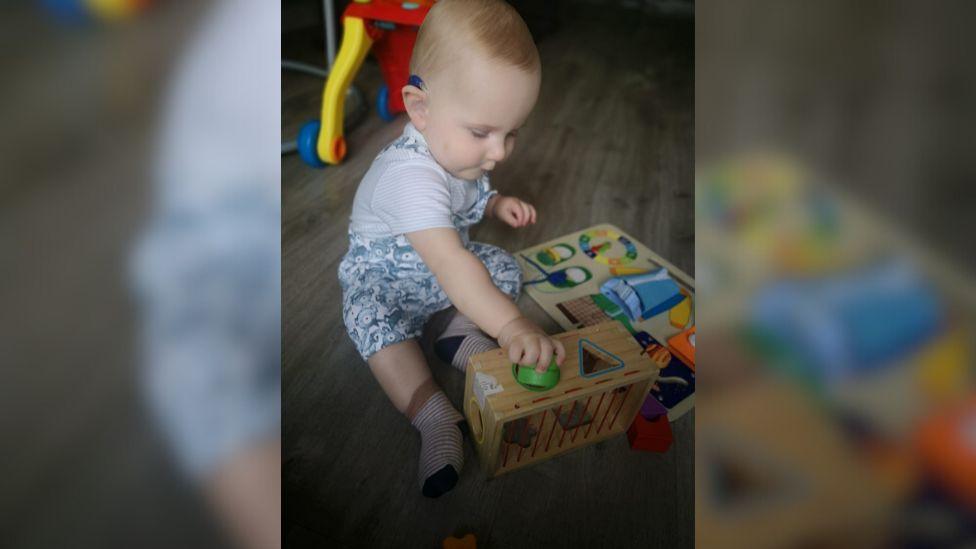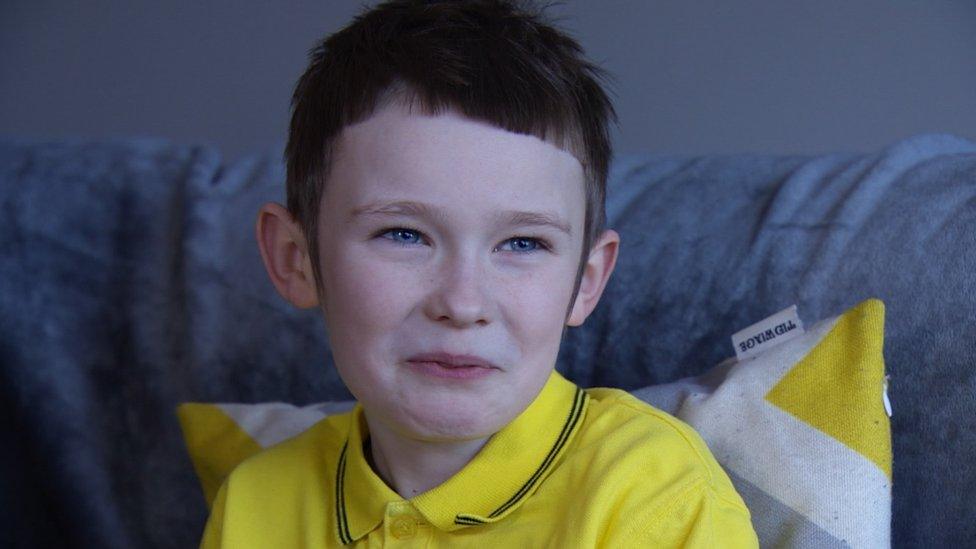Mother struggles to access sign language classes for deaf son
- Published

Janine Boyd and her son Mason who was born profoundly deaf
A County Tyrone woman with a deaf baby said she cannot communicate properly with her son due to a difficulty accessing sign language services.
Janine Boyd, 37, whose 10-month old son Mason was born deaf said she constantly worries about his future.
Charities that provide deaf services have said they know it is difficult for families to access services.
There are currently 1,476 deaf children in Northern Ireland, according to a charity.

Mason is 10 months old and uses hearing aids
Ms Boyd's son is profoundly deaf - he has limited-to-no hearing capability.
Her baby was just a few weeks old when he was diagnosed.
"We were handed booklets and stuff of what to do and told we'd get an appointment for his hearing aids. I didn't know what to do, I didn't know anything about being deaf."
Ms Boyd said charities like the National Deaf Children's Society (NDCS) gave her some initial support by offering free coaching in basic British Sign Language (BSL).
'You can't leave him alone'
But basic classes are not enough.
"I can sign words but I can't form a sentence so I can't fully communicate with my son," she added.
She said Mason, who is already walking, cannot be left alone at any time.
"You can't even go to the other end of the room without watching him because you can't shout at him to stop something or if he's in danger, you just have to sprint to catch him - because he cannot hear anything," she said.
British Sign Language classes are categorised in six levels from level one (beginner) to level six (advanced) and more advanced classes often have to be paid for.
"Classes for higher levels of sign language are mostly in the evenings. And the classes [for one level] can range in price from £400-£600 per person - so for me and my partner it's a lot of money," Ms Boyd explained.
Action Deaf Youth, a Belfast-based deaf charity, does offer free BSL classes for all levels but to take full advantage the charity said families should travel to Belfast to attend them.
Ms Boyd said it is a struggle to do that.
"I'm in Dungannon, that's an hour away [from Belfast]. We have three kids in the house, what do we do with the kids?
"It's very hard for us to just go down to Belfast for them [classes] and work, get kids in and out of school, and everything else."

Mason can only respond to what he sees and feels so he can't be left alone
Service cuts
Caroline Doherty is the director of Action Deaf Youth and said recent budget cuts are having an effect on services.
"Part of our services have been severely impacted by the EA (Education Authority) - we are pausing our youth service come September as we can't afford to run them. As a small charity we are continuously battling with funds and very reliant on donations."
The National Deaf Children's Society said access to sign language classes can be a struggle.
"We are aware that finding suitable, funded BSL courses is very difficult for parents as most of them are delivered by FE [Further Education] colleges in the evenings and they can be quite expensive," it said.
The NDCS receives funding from the Department for Communities (DfC) and funds are also allocated from the EA to support deaf services.
The charity said it can offer basic Family Sign Language courses for ages 0-5 but after that "it can be difficult for parents to access accredited BSL courses".
"A lack of support could have a catastrophic impact on deaf children's development," the charity said.
In a statement, DfC said family sign language learning remained a "key priority for the department".
"The sign language team is currently planning this year's funded courses by assessing current learning priorities with its deaf organisation delivery partners and through feedback from parents of deaf children."


The EA has services to give extra help to autistic children, those needing support with literacy and numeracy, or those with sensory impairment.
That includes children and young people who are deaf and hard of hearing.
It also funds other organisations to deliver some services for deaf children and their parents.
But the authority is facing a budget squeeze, rising need, and limits on recruitment.
The worry is that it will reduce some of the support it can offer.
And that could affect the present and the future for some children and their families who rely on it.

The department added that it currently funds "a range of courses from an introduction to sign language to a degree equivalent British Sign Language level six course".
A spokesperson for the EA said in a statement that it "recognises the impact that early language development has on deaf children's progress.
"The EA also understand that finding suitable funded British Sign Language (BSL) courses is very difficult and often courses are only available in the evenings and are not funded."
"The EA continues to work closely with charities such as the National Deaf Children's Society to find solutions for the lack of suitable sign language courses for children, young people and parents."
Ms Boyd said the current system for deaf children and their families was unfair.
"Any other child has access to proper schooling and the ability to speak, why is a deaf child and their family not given the opportunity of learning sign language to be able to communicate effectively to each other?"
Mason is currently waiting to receive a cochlear implant, which provides the sensation of hearing, but does not restore hearing.
"[The implant] is not always going to make someone fully understand the sentence," said his mother.
"If you were able to sign a full sentence to someone, they can't get that wrong. A deaf person will fully understand what you're telling them with sign."
- Published16 March 2022

- Published7 March 2019
